経済教育・国際セミナー:Int'l Conference on Economic Education [Report]
経済教育・国際セミナー:International Conference on Economic Education
早大アジア太平洋研究センター(WIAPS)経済教育部会のプログラム
Organized by Research Group of Economic Education, WIAPS
日時:2008年2月16日(土)10:00-17:00; February 16, 2008
会場:早大国際会議場; Int'l Conference Room, Waseda University
スピーカー:米国ハワイ州経済教育協議会(HECC)のメンバー3名
Speakers: Three members of HECC (Hawaii Council on Economic Education)
司会:阿部信太郎城西国際大学専任講師;主催者代表・開会挨拶:山岡道男早大教授
Prof. Shintaro Abe & Prof. Michio Yamaoka, giving opening address
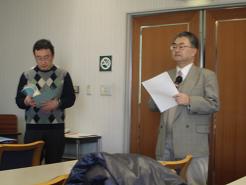
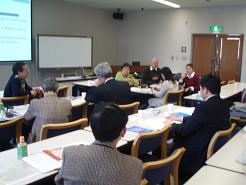
2月16日(土)10:00-17:00に早大国際会議場の会議室で、アジア太平洋研究センター経済教育部会主催の経済教育国際セミナーが開催された。主催者代表である山岡道男早大教授の開会の辞に続いて、阿部信太郎城西国際大学専任講師の司会で行われた午前のセッションでは、まず第1に、ゲイル・タマリブチ・ハワイ大学中等教育教員教育プログラム主任が、「米国の学校における自由選択とカリキュラムの決定」についてプレゼンを行った。そこでは、米国の高校生と成人の間で経済的な理解度は高まっているものの、まだ十分ではなく、特に州や地域によって格差が大きいこと、さらに米国のカリキュラムに4つ目の「R」として経済的な考え方(Reasoning)を加えるための努力が必要であることを強調した。
ゲイル・タマリブチ・ハワイ大学教員プログラム主任とリチャード・ランキン・イオラニ高校教諭
Ms. Gail Tamaribuchi (Univ. of Hawaii) & Mr. Richard Rankin (Iolani School)
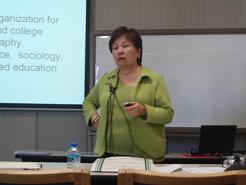
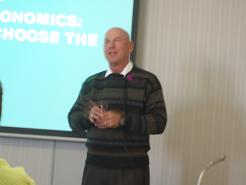
第2に、リチャード・ランキン・イオラニ高校教諭が、学生に対して、例えば「限界費用」、「機会費用」、「利潤の役割」などの重要な概念を忘れないように記憶させるためによく利用する教え方を具体的に示した。そのような重要な概念と結びついた経済的な活動を実感・体験させるために、例えば赤いハンカチ、レモン、紙、ハサミなど簡単に手に入るものを使うことが指摘された。
それに続いて第3に、クリスティン・キャスタグナーロ・ハワイ州経済教育協議会理事は、「経済学カドレ」(リーダーシップ養成)プログラムを取り上げ、それがハワイ州の公立高校において「経済学チャンピオン」と呼ばれる経済学教員を養成し支援することを目的に2007年9月に設立されたプログラムであることを説明。このプログラムは現実的な制約の下でも推進できるもので、経済学チャンピオンになった教員たちが高校のカリキュラムに経済学を含めるべきと主張し、その方向に進むことが期待されると結論づけた(「経済学カドレ」については以下のリンク参照)。
教室での教え方を示すランキン教諭とクリスティン・キャスタグナーロ経済教育協議会理事
Mr. Rankin's Teaching Demontration & Ms. Kristine Castagnaro (HCEE)
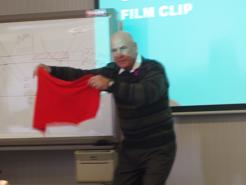
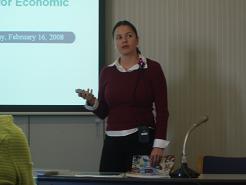
午後のセッションでは、以上の3人のスピーカーがそれぞれの立場から経済教育が抱える問題点を指摘。まず、タマリブチ主任は、2001年に制定された「No Child Left Behind Act」が経済教育に対して持つマイナスの影響を議論し、またランキン教諭は、昨年の全米AP経済学テストで示された学生の弱点と、それに対して大学委員会が行っている対応策を取り上げた。そして最後に、クリスティン・キャスタグナーロ理事は、金融教育のカリキュラムを伝統的なハワイの文化にリンクさせる試みで自らが経験した問題点を詳しく説明した。
プレゼン後の自由討論の時間に、スピーカーとセミナー参加者の間で質疑応答が行われ、またその後の懇親会でさらに人的交流が行われた。すべての参加者にとって非常に興味深く役立つ内容のセミナーであったといえよう。
閉会挨拶:浅野忠克氏(山村学園短期大学);Closing Address: Prof. Tadayoshi Asano
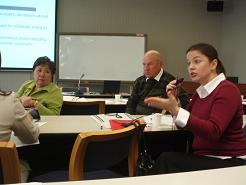
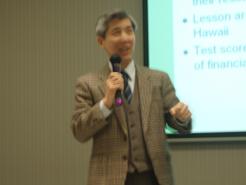
参考:「HCEE」ホームページ:http://econed-hawaii.org/
「経済学カドレ」について:http://econed-hawaii.org/cadre.aspx/
----------------------------------------------------------------------------
The International Conference on Economic Education, organized by the Research Group of Economic Education, WIAPS (Waseda Institute for Asia-Pacific Studies, was held at the International Conference Room at Waseda University on February 16 (Sat), 10am - 5pm.
After Waseda Univ. Professor Michio Yamaoka gave a brief opening address, Josai Int'l Univ. Lecturer Shintaro Abe moderated the main session by first having Ms. Gail Tamaribuchi (Chair, Secondary Program, Institute for Teacher Education, University of Hawaii at Manoa) make her presentation on "Free Choice & Curriculum Decisions in U.S. Schools." She emphasized that, while economic understanding among high school studens as well as adults seems to be progressing, there is still much room for improvement, especially in some states and localities, and more efforts are needed to make economic reasonsing the 4th R in the U.S. school curriculum.
Second, Mr. Richard Rankin (Advanced Placement Economics Teacher, Iolani School, Honolulu) shared with the seminar participants some of the teaching strategies that he often use to help students remember key economic concepts such as marginal cost, opportunity cost, the role of profits, etc. He used such simple things as a red handkerchief, a lemon, a sheet of paper, a pair of scissors, etc. to make students feel and experience economic activities associated with key concepts.
Third, Ms. Kristine Castagnaro (Executive Director, HCEE) explained the "Economics Cadre" program, which was launched in September 2007 to create and support those economics teachers who might be called "economics champions" within Hawaii's public high school system. She concluded that the Economics Cadre is a realistic program under the current circumstances to encourage teachers, especially, economics champions, to advocate for inclusion of economics in the high school curriculum (see the reference below).
After lunch, the three speakers in turn took up various problems in economic education. In particular, Ms. Tamaribuchi focused on some negative impact of the "No Child Left Behind Act of 2001" on economic education, whereas Mr. Rankin talked about U.S. students' weakness as indicated by last year's national AP Economics exams and how the College Board is attempting to address those weaknesses. Finally, Ms. Castagnaro pointed out difficulties in linking native culture to economic education by sharing her experience in developing a financial literacy curriculum in relation to the native Hawaiian culture.
Free discussions and interactions between the speakers and the participants took place after the presentations as well as at the networking party. Clearly, it was a very stimulating and informative seminar for all the participants.
References:
HCEE Website: http://econed-hawaii.org/
Economics Cadre: http://econed-hawaii.org/cadre.aspx/



